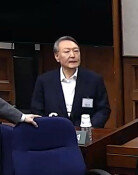`Majority of Koreans Positive Toward Multicultural Families`
`Majority of Koreans Positive Toward Multicultural Families`
Posted October. 16, 2010 11:02,
The majority of Koreans say their country has turned into a multicultural society and are positive toward multicultural families, the results of a survey released Friday said.
In the poll, 79.5 percent said they view multicultural families positively as opposed to 17.2 percent who do not. Fifty-seven percent of those with positive views said multicultural families will enhance Koreas diversity and openness, while 16.6 percent predicted higher national competitiveness due to the influx of foreign workers.
Others said multiculturalism improves Koreas international image (11.7 percent) and helps slow the decline in population amid the countrys low birth rate (10.6 percent).
Respondents also said, however, that the rising number of multicultural families could undermine Koreas social unity. Nearly half of those with negative views of multicultural families warned of culture clash and social friction, while others expressed fear over the negative impact of such families on Korean traditions and culture.
A little more than 10 percent of those with negative views warned of fewer job opportunities for Koreans, suggesting higher unemployment and welfare spending caused by the economic slump could ignite a backlash against multicultural families.
Seol Dong-hoon, a sociology professor at Chonbuk National University, said that if the children of multicultural families are deprived of educational opportunities and inherit poverty, this could fan social conflict. In the event of an economic crisis, multicultural families could clash with Koreans in the lower-income brackets, he said.
○ Discrimination mars Koreas national brand
Discrimination against people from other cultures lingers in Korea, with 76.6 percent of respondents saying Korean society discriminates against multicultural families while 21.1 percent saying it does not.
The study also indicated that racial bias remains deeply rooted in Koreans, with 78.6 percent saying their attitude toward multicultural families is affected by the nationality or race of foreign spouses married to Koreans.
Koreans have a clear dichotomy since they consider foreigners as white people who speak English and immigrants as Asians speaking Korean or Southeast Asian languages, said Min Moo-suk, a senior researcher at the Korean Womens Development Institute. Discrimination is based on such bias.
Among those polled, 72.7 percent said the discriminatory attitude toward multicultural families will negatively impact Koreas national brand. This belief was mostly held by economically active people those in their 30s (80 percent), those with a university education or higher (79.4 percent), and those with a high income (80.2 percent).
○ Passive toward intl marriages
The poll also suggests that many Koreans have a double opinion of international marriages, saying they are not opposed to such unions but believe they negatively impact Korean society.
On marriages between Korean men and Asian women, 61.4 percent said they should not be encouraged and urged the government to prevent side effects such as fake marriages or human rights violations.
More than 15 percent said such marriages should be actively encouraged, while 6.9 percent said they must be kept in check.
Many respondents, however, expressed fear over the negative impact of international marriages. In the survey, 28.5 percent spoke of family friction and disintegration caused by cultural differences; 28.4 percent human rights violations against marriage immigrants and the ensuing damage to Koreas national image; and 24.1 percent human trafficking factors in international marriage.
These negative views were reportedly influenced by recent crimes against international marriage immigrants in Korea, including Vietnamese and Mongolian brides murdered by their Korean husbands.
Almost half of those surveyed urged the provision of accurate information about their Korean spouses and thorough screening through stricter immigration procedures. Others suggested stricter requirements for international matchmaking agencies and the establishment of a non-profit marriage agency.
woohaha@donga.com




![[단독]위기의 K배터리…SK온 ‘희망퇴직-무급휴직’ 전격 시행](https://dimg.donga.com/c/138/175/90/1/wps/NEWS/IMAGE/2026/02/20/133389142.1.jpg)


